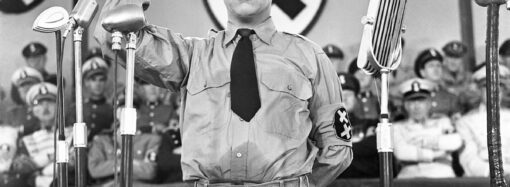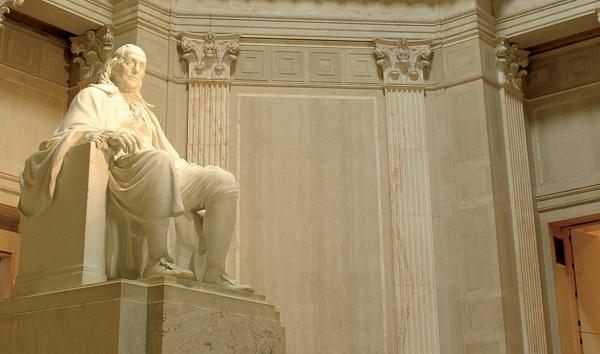This essay was first published in the May 31, 2023 Epoch Times.
Benjamin Franklin was born in Boston on Jan. 6, 1706, the youngest son among a tradesman’s 15 children by two successive wives. He had two years of formal education. At the age of 12 he was apprenticed to his older brother James, a printer. Five years later, he ran away to New York. He couldn’t find a job there. He was forced to travel on to Philadelphia, arriving with one Dutch dollar and about 20 pence in copper.
But in the next 25 years, Franklin—
- established a successful printing business, with affiliated businesses throughout the colonies;
- established a successful newspaper, the Pennsylvania Gazette, and also founded America’s first German-language newspaper;
- created a highly popular annual almanac—“Poor Richard”—and composed the first series of political essays in American literature;
- taught himself to read, write, and translate German, French, Italian, Spanish, and Latin;
- organized America’s first public library, a fire department for Philadelphia, the American Philosophical Society, and a militia company;
- invented the Franklin stove and a new printing method to prevent the counterfeiting of paper money;
- served as clerk of the Pennsylvania colonial assembly, postmaster of Philadelphia, and co-postmaster for North America;
- studied and wrote on the nature of whirlwinds and water spouts, and undertook the groundbreaking experiments in electricity that led to world-wide recognition—including several honorary masters degrees, and honorary doctorates from the University of St. Andrews and Oxford.
And that was just the first half of his life.
In 1748, around the time of his 42nd birthday, he retired from active management of his businesses. He continued to write essays and pamphlets on all sorts of subjects. In addition, he continued his scientific work—pursuing further discoveries in electricity, building the first model basin for planning the design of ships, inquiring into the nature of the Gulf Stream, and inventing bifocal glasses and the lightning rod.
But after his 42nd birthday, he devoted most of his life to public service. He supported the American cause against Britain. He served in the Pennsylvania assembly (and briefly as its speaker). He was a member of the Continental and Confederation Congresses. He joined John Adams, Robert Livingston, and Roger Sherman on the committee that oversaw Thomas Jefferson’s drafting of the Declaration of Independence.
Franklin also was U.S. postmaster-general for a time, and for 25 years was a diplomat in Europe (1757–1762; 1764–1775; 1776–1785). At various points during his stay in Europe, he represented the governments of Massachusetts, New Jersey, Georgia, Pennsylvania, and the United States.
When he returned to America in 1785, the Pennsylvania executive council elected him state president. He was in that office when the Constitutional Convention met.
Visionary Documents
One way Franklin contributed to the framing of the Constitution was by composing documents that helped pave the way for the Constitution. In 1754, he represented the Colony of Pennsylvania at an intercolonial convention called principally to negotiate with the Six Nations of the Iroquois. The meeting was held in Albany, New York. (Albany was a frequent meeting site for conventions of colonies when business with the Natives was on the agenda.)
Franklin teamed up with Thomas Hutchinson of Massachusetts to write the “Albany Plan of Union”—a blueprint for a federation of American colonies. The plan was rejected both by the colonies and by the British government. Nevertheless, its general concept and some of its specific language influenced later documents. For example, the chief executive of the proposed federation was the “president-general” (meaning “common president”), there was a reference to a house of representatives, and a section that looked a lot like the Constitution’s Indian Commerce Clause (part of Article I, Section 8, Clause 3).
After the Revolutionary War had commenced but before the Declaration of Independence, Franklin proposed another proto-constitution. This was his “Articles of Confederation for the United Colonies of North America.” The final Articles of Confederation (drafted in 1776–1777; effective in 1781) differed from Franklin’s draft in many ways, but anyone who compares the two documents can see that the later one owed much to its predecessor. Moreover, in 1776, Franklin chaired the convention that drafted the Pennsylvania constitution.
The Post Office
Before Independence, the American postal system was an integrated part of the British imperial postal system. As noted earlier, Franklin had served as postmaster general for the colonies. After Independence, he became the postmaster general for the Continental Congress. Largely due to his influence, the founding generation retained the pre-existing institution rather than creating a new one.
My research article, “Founding Era Socialism: The Original Meaning of the Constitution’s Postal Clause” (pdf), tells the story of the early American post office, Franklin’s role, and the insertion of the Postal Clause into the Constitution (Article I, Section 8, Clause 7).
The Constitutional Convention
Some of the framers—men such as John Rutledge and Edmund Randolph—saw many of their specific suggestions incorporated into the Constitution. That wasn’t true of Franklin. Still, his contributions at the federal convention were of central importance.
To begin with, his encyclopedic knowledge of diplomacy, history, politics, and business provided the other commissioners with a source of reliable information in that pre-internet age. For example, when several delegates supported creating a very strong president with an absolute veto over congressional bills, Franklin tempered their enthusiasm by relating how executives in the Netherlands and colonial Pennsylvania had misused their powers.
As was true of Washington, Franklin’s presence tended to keep the delegates on their best behavior. They were wary of offending the iconic Washington, and they responded to the humor of the witty Franklin.
Franklin often used his wit to communicate real-world lessons. James Madison recorded Franklin’s interjection during a discussion of how to appoint federal judges:
“Docr. Franklin observed that two modes of chusing [sic] the Judges had been mentioned, to wit, by the Legislature and by the Executive. He wished such other modes to be suggested … He would mention one which he had understood was practiced in Scotland. He then in a brief and entertaining manner related a Scotch mode, in which the nomination proceeded from the Lawyers, who always selected the ablest of the profession in order to get rid of him, and share his practice among themselves.”
The point was, Franklin added, that the Constitution should be written so that whoever appointed the judges had a personal interest in making the best choice.
On June 28, 1787, the delegates were particularly fractious. Franklin—the former deist, now a non-denominational theist—recommended a daily invocation by a local clergyman: “Sir,” he said, “the longer I live, the more convincing proofs I see of this truth—that God governs in the affairs of men. And if a sparrow cannot fall to the ground without his notice, is it probable that an empire can rise without his aid?”
His suggestion wasn’t adopted, at least in part because the convention had no funds to pay a clergyman. But it’s impossible to believe that Franklin’s plea was without effect.
Sometimes Franklin reminded his colleagues of basic principles. On July 2, he told them, “In free Governments the rulers are the servants, and the people their superiors & sovereigns”—a view we modern Americans should recall when government treats us as children.
The sage of Pennsylvania steadfastly stood up for the rights of the lower classes because he disliked “every thing that tended to debase the spirit of the common people.”
Although the Connecticut delegates (discussed in the next installment in this series) were largely responsible for the “Great Compromise,” it actually was Franklin who headed the committee that proposed the compromise and moved its adoption. This was the bargain whereby (1) the House of Representatives was to be allocated (mostly) by population, (2) each state was to have two senators, but (3) only the House could initiate revenue bills.
Franklin’s closing remark of the convention—the famous one about the half-sun on the back of the presiding officer’s chair being a rising rather than a setting sun—helped inspire the delegates to promote their handiwork to the public. The signatures of Washington and Franklin reassured the voters and the delegates they elected to the state ratifying conventions.
More on Franklin’s Personal Life
On Sept. 1, 1730, Franklin married Deborah Read. They raised Franklin’s illegitimate son William as their own. She presented her husband with a boy, Francis, who died when he was 4, and a daughter, Sarah, who lived until 1808.
However, Deborah (unlike Abigail Adams) was afraid of ocean travel and refused to accompany her husband when he went on assignment to Europe. This must have ended their marriage for most purposes. Deborah died of a stroke in 1774.
The end of the Constitutional Convention and the expiration of his term as state president the following year represented the close of Franklin’s political career. He continued to live in Philadelphia, spending much of his time writing and performing scientific experiments. He died of pleurisy on April 17, 1790, age 84.
Read prior installments here: first, second, third, fourth, fifth, sixth, seventh, ninth, tenth, eleventh.








